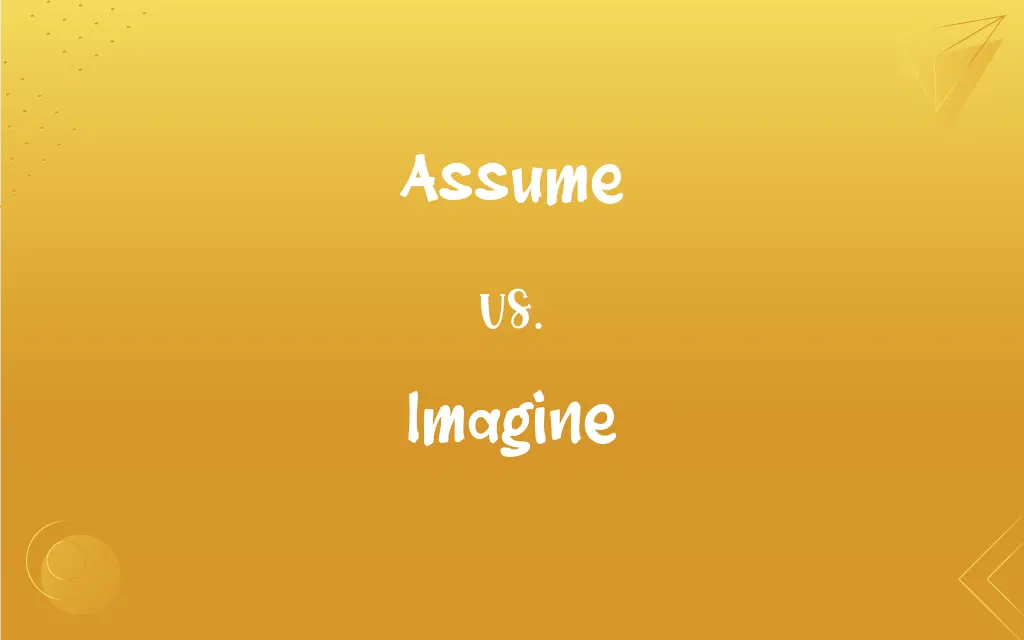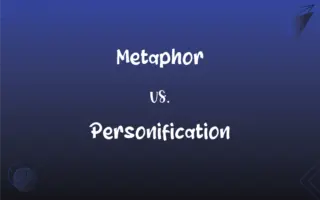Assume vs. Imagine: What's the Difference?
Edited by Aimie Carlson || By Janet White || Published on January 9, 2024
Assume refers to accept something as true without proof. Imagine refers to form a mental image or concept not present to the senses.

Key Differences
Assume involves accepting a premise or fact without concrete evidence, often based on probability or general belief. Imagine, on the other hand, is the act of creating or visualizing scenarios, ideas, or images in the mind that are not immediately present or real.
When you assume, you take for granted that something is true or will happen, sometimes leading to conclusions without full verification. To imagine is to engage in a creative process, envisioning possibilities, scenarios, or concepts that might not be based in reality.
Assume is often used in contexts where a decision or judgment is made with incomplete information. Imagine involves a more free-form thought process, exploring ideas and mental constructs without the constraint of current reality or concrete information.
Assume can lead to misconceptions if the underlying beliefs or suppositions are incorrect. Imagine is a foundational element of creativity and innovation, allowing the exploration of ideas beyond the confines of existing knowledge or evidence.
Assume often pertains to beliefs or expectations about the real world, while imagine is about conjuring up ideas, worlds, or possibilities that might not exist or have yet to be proven.
ADVERTISEMENT
Comparison Chart
Definition
Accepting something as true without proof
Forming a mental image of something unreal
Context
Used in decision-making, judgments
Used in creativity, speculation
Basis
Often based on likelihood or existing knowledge
Based on creative thought, beyond reality
Outcome
Can lead to misconceptions if incorrect
Encourages exploration of new ideas
Usage in Language
More factual, less creative
More creative, less factual
ADVERTISEMENT
Assume and Imagine Definitions
Assume
Take for granted.
I assume you're coming to the party.
Imagine
Think, suppose.
I imagine you must be tired after the trip.
Assume
Suppose without proof.
He assumed the project would be delayed.
Imagine
Believe, perhaps falsely.
I imagine she's not coming today.
Assume
Undertake a role or responsibility.
She assumed the role of team leader.
Imagine
Create an idea or image of.
He imagined a design unlike any other.
Assume
Presume something to be true.
We assume that all attendees are aware of the rules.
Imagine
Form a concept of.
She could hardly imagine life without technology.
Assume
Adopt a certain characteristic.
The situation assumed a serious tone.
Imagine
Visualize mentally.
Imagine a world where peace reigns.
Assume
To take for granted; suppose
The study assumes that prices will rise.
Imagine
To form a mental picture or image of
Imagined a better life abroad.
Assume
To take upon oneself (a duty or obligation)
Assume responsibility.
Assume another's debts.
Imagine
To think or suppose; conjecture
I imagine you're right.
FAQs
Does imagination rely on real-world evidence?
Not usually, it's more about creative or abstract thinking.
Is assuming always based on facts?
Not necessarily, it often involves an element of conjecture.
Can you imagine something that is impossible?
Yes, imagination is not limited by reality or possibility.
Can assume and imagine be used interchangeably?
No, they have distinct meanings and contexts.
How does imagination contribute to problem-solving?
It enables thinking outside the box and exploring novel solutions.
Can assumptions change over time?
Yes, as new information becomes available, assumptions may evolve.
Does assume imply certainty?
It suggests a degree of belief, but not absolute certainty.
What does it mean to assume?
To accept something as true without needing proof.
How is imagine used?
To create a mental image or concept of something not present.
Is it safe to make assumptions in critical decisions?
Caution is advised as assumptions may not always be accurate.
Are there risks in assuming?
Yes, especially if the assumption is based on incorrect information.
Is imagination a skill?
Yes, it's a cognitive ability that can be developed and nurtured.
How do you distinguish between what's assumed and imagined?
By evaluating the basis of your thoughts: evidence or creativity.
Is imagination limited by age?
Not inherently; people of all ages can imagine creatively.
Are assumptions necessary in daily life?
To some extent, as they help in making quick judgments.
Can both assuming and imagining be positive?
Yes, when used effectively and appropriately, both have benefits.
How does culture influence imagination?
Cultural background can shape the way people imagine and create.
How do assumptions impact communication?
They can lead to misinterpretations if not clarified.
Can imagining be a form of escapism?
Yes, it can offer a mental refuge from reality.
Can assumptions be harmful?
They can lead to misunderstandings or incorrect conclusions.
About Author
Written by
Janet WhiteJanet White has been an esteemed writer and blogger for Difference Wiki. Holding a Master's degree in Science and Medical Journalism from the prestigious Boston University, she has consistently demonstrated her expertise and passion for her field. When she's not immersed in her work, Janet relishes her time exercising, delving into a good book, and cherishing moments with friends and family.
Edited by
Aimie CarlsonAimie Carlson, holding a master's degree in English literature, is a fervent English language enthusiast. She lends her writing talents to Difference Wiki, a prominent website that specializes in comparisons, offering readers insightful analyses that both captivate and inform.






































































